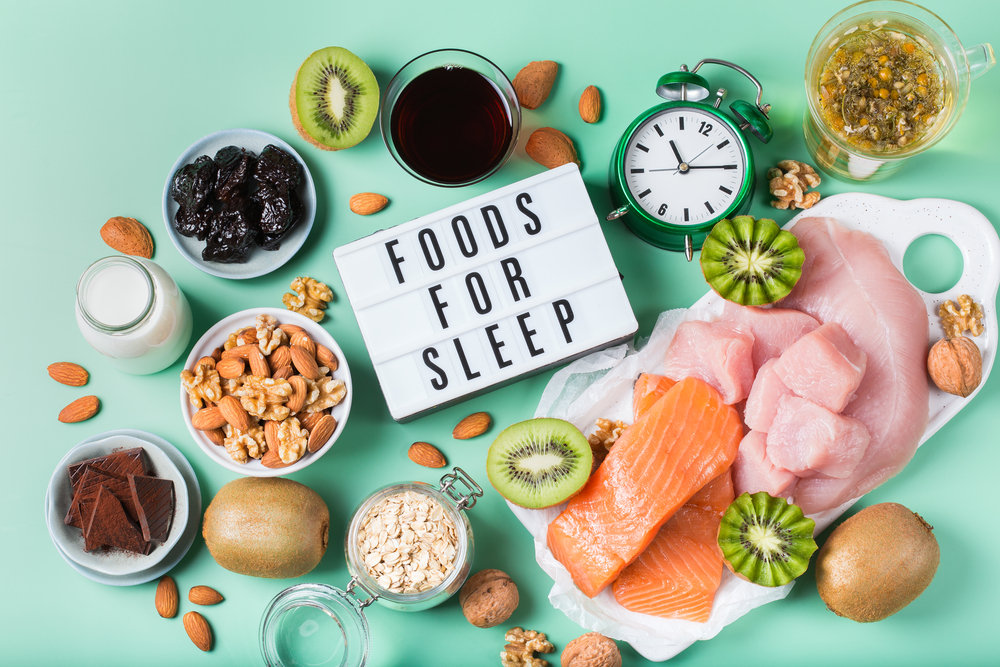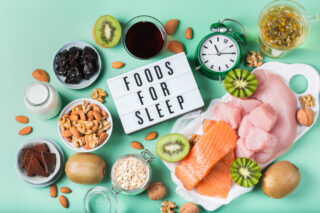Nutrition and Sleep–A Love Story
It’s no secret that maintaining a balanced and nutrient-dense diet is essential for your immune system, endocrine system, and every other system within the body to function at the optimum. Vitamins, minerals, and compounds within the food you eat provide your body with the fuel it needs to operate on a cellular level–without the proper amount of macronutrients such as carbohydrates, protein, amino acids, fiber, fats, and water, your body will start to shut down. This manifests in the form of brain fog, inability to perform daily tasks, lethargy, poor decision-making, weight gain, weight loss, fatigue. Nutrition and sleep go hand in hand.
Your sleep patterns are dependent on what you consume throughout the day. If you are deficient in certain nutrients, there is no doubt about it–sleep problems and fatigue will come knocking at your door. When you mix a poor diet with poor sleep–that’s when more long-term effects can unfold. Not only that, but studies show that when you are tired, you tend to have trouble with decision-making, leading to poorer choices–especially when it comes to the food you eat. Junk food and convenient snacks–especially processed foods–seem like the easier option, but unfortunately these choices have consequences.
Sleep and Weight Regulation
As mentioned in previous articles, getting a proper night’s rest on the daily will help you avoid overindulgence and hunger triggers when you’re not actually hungry. This false signal that you are hungry or have a huge appetite even when you’ve just eaten or are truly full is due to sleep deprivation and its effect on hormones that identify hunger.
Sleep gives you the energy you need to move through the day with ease, serving as that little push to help you get up and at ’em’ and motivate you to get in some physical movement. But weight management can become a concern when you are getting less quality sleep. Sleep deprivation side effects are not to be taken lightly.
A series of studies illustrate that sleeping too little creates a natural response to seek food for energy, causing people to eat bigger portions in hopes of finding the stamina to trudge on through the day. However, bigger portions or a bigger appetite paired with diminished ability to make the right decisions will, overtime, lead to weight gain and obesity. A recent study revealed that there is a major correlation between short sleep duration and obesity among a group of university students.
To top it all off, lack of sleep also leads to increased cravings for energy-dense foods. These include foods high in carbohydrates, fat, or simply high in calories. That glimmer of hope you find in the burst of energy after a large, nutrient-deficient meal is a sham–don’t buy into this pseudo stamina because it is simply not sustainable. Having an affinity for these not-so-good-for-you foods will shrink immensely if you take proper care of your body and strive for 7–8 hours of uninterrupted sleep daily.
Foods to Avoid When Sleep Deprived
Certain foods can irritate you and cause your brain to stay wired. It is recommended to avoid meals high in carbohydrates or with high glycemic indexes, as they can influence both sleep quality and energy levels, among many other things like cognitive function. Diets high in refined carbs and sugars are linked to developing insomnia. That’s right–no matter how sweet, sugar is not your friend! Don’t rely on it to give you energy, it will just end up wearing you down in the end.
So what causes sleeplessness, insomnia, or general difficulty falling and staying asleep? Well, for starters, anything that contains ingredients known to cause wakefulness and increased energy: caffeinated or sugary foods and beverages–such as coffee, soda, cacao products, as well as products that are sweetened with natural and artificial sugar–will affect not only how long it takes you to fall asleep, but also stay asleep. Frequently consuming energy drinks and sodas throughout the day will lead you down one door and one door only–poor sleep. Similarly, winding down with a glass of wine or a bevy is not great for your sleep schedule. It might make you feel relaxed at the moment, but it’s actually tricking your mind.
Oddly enough, spicy foods can be a culprit for inadequate sleep. Spicy foods tend to lead to heartburn, which can cause irritation and make it difficult to lie down. Once asleep, heartburn can increase the amount of times you awaken in the night and prevent deep sleep from taking place. Spicy foods along with highly acidic foods can also exacerbate the effects of obstructive sleep apnea. The root cause is backed-up acid, which agitates your airway and raises your body temperature, as opposed to cooling it down, which is not ideal for sleeping. When your body has a hard time self-regulating temperature before and during sleep, it can contribute to crappy sleep patterns.
Your protein levels also have a major impact on how sufficient your sleep quality is. Both a diet low in protein and a diet with too much protein can result in difficulty maintaining and staying asleep. Effects of insomnia on the body combined with low protein intake can influence much more beyond your decision-making in the kitchen; it can cause major fatigue, leaving you feeling sluggish and unable to sustain energy throughout the day. You’ll want to ensure you don’t eat too much or too little protein–perhaps monitoring your macros, fats, carbs, and proteins to avoid any room for error.
Interestingly, there is a debate on the benefits of ingesting or using salt for sleep. Eating a meal high in sodium around dinnertime can lead to higher than normal blood pressure and fluid retention, leading to sleep disturbances. That said, salt baths or warm water Epsom salt foot soaks are known to help you relax and prepare for sleep. Salt is known to raise oxytocin levels, which are responsible for promoting calmness and relaxation. Consider less salt on the plate and instead opt for the tub.
You’ll want to eliminate processed foods and have less red meat, and simply say goodbye to foods with added sugars. Remember to hydrate before bed, avoid increased munching and irregular meal patterns.
Healthy Diet = Healthy Sleep Schedule 
If you notice patterns in your eating habits that aren’t where they could be in terms of health-forward, or if your energy levels seem to consistently be low, first assess how much sleep you’re getting. Are you tossing and turning throughout the night? Are you having trouble getting to bed, or waking up in the morning? If you answered yes to any of these, it’s likely you need to switch up your diet. Thankfully, there are loads of nutritious foods and beverages that will help improve your sleep.
So what foods will support you in your journey to a better night’s sleep? Colorful vegetables, fresh fruit, whole grains, high-quality carbohydrates and foods high in fiber are the game changers here. High fiber, low-carb, low-fat protein diets are what you’re aiming for.
High fiber and high protein foods include asparagus, as well as cruciferous veggies such as broccoli and cauliflower, leafy greens, blackberries, and raspberries. Chia seeds are a fabulous source of protein–throw it in your water in the morning or before bed, and you’ve just hydrated yourself with a protein packed chia water. A Mediterranean diet–composed of olive oil, nuts, beans, and seeds–is known to improve sleep quality.
Low-fat proteins such as skinless white-meat chicken or turkey, sirloin steak, lean ground beef, lentils, low fat tofu or cottage cheese, and certain beans, such as kidney beans, black beans, and garbanzo beans are all perfect ways to receive protein for fuel. You’ll also want to consider including protein-packed foods that contain tryptophan–most notably turkey, chicken, cheese, egg whites, salmon, lean pork chops, firm tofu, boiled soybeans and other soy products, milk, oatmeal, as well as seeds: squash, pumpkin, and sunflower. The amino acid tryptophan increases the production of melatonin, which is a property attributed to sleep. These foods are your friends!
Foods rich in magnesium can help stop symptoms of insomnia dead in their tracks. Quinoa, cashew nuts, sesame seeds, spinach, soybeans, mackerel, avocado, okra, swiss chard, coconut milk, oysters, and Lima beans, are all also high in magnesium. Bananas are loaded with magnesium–containing a whopping 32 mg per medium size banana, but prickly pears are definitely the most magnesium rich fruit. The peel of the banana has three times the amount of magnesium as the fruit itself, so if you’re looking for an all-natural, magnesium rich bedtime beverage, you can steep an unpeeled banana in a cup of hot water until it turns brown. It might sound gross, but don’t knock it till you try it–it has amazing calming effects.
Other fruits that will help you achieve solid REM sleep–but don’t eat too close to bedtime–are tart cherries and kiwifruit, as they offer magnesium and phosphorus as well as a good source of potassium. Of course, you can also get a supplement to help get you back on track, but you’ll want to get to the point of allowing your body to produce melatonin naturally eventually. This is achieved by getting a good sleep schedule of uninterrupted sleep–a solid 7–8 hours daily. Taking B vitamins and consuming foods rich in vitamin B, such as fish, lean poultry, meat, legumes, eggs, and dairy are great for regulating melatonin, too. There are 12 other essential vitamins and several minerals that your body needs to power its complex systems, so don’t forget about those, either!
Hydration and Electrolytes
Healthy eating habits will encourage healthier sleeping patterns, but proper hydration is KEY! Water is the essence of life, after all. Need we say more? But in reality, dehydration can create huge barriers for sleep, and–as with many other things that are adversely correlated and perpetuated–insufficient rest may increase your chances of being dehydrated. Studies show that among 20,000 people who participated in a sleep study where they only received six hours per night, they had significantly higher rates of dehydration than people who slept eight hours.
Adequate daily hydration and proper nutrition are crucial if you want your body to function properly and develop superior sleeping habits! Don’t sleep on these nutrition hacks, which will undoubtedly give you an upgrade in both your sleep patterns and overall quality of life.
If you suffer from poor sleep or feel you could improve your sleep regimens and overall health in some capacity, reach out to one of our sleep science experts today!


